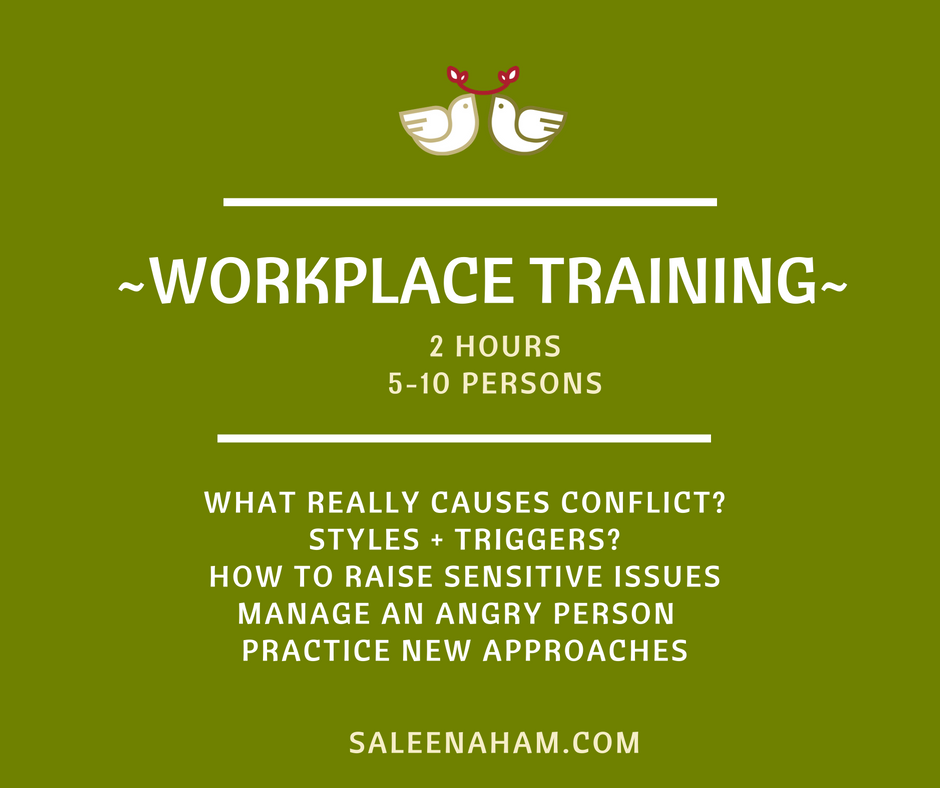Boundaries. We all need them.
We need them to keep safe. To protect ourselves.
To look after values and standards. To be clear about accountabilities.
To uphold the interests of our family and the community.
But holding the line on boundaries and accountabilities can be a very sensitive business and fraught with danger.
Why we don’t like calling boundaries.
Often we don’t want to Go There because we feel we do not have the power to safely raise the question – for fear of escalating a situation, or creating a rift in relationship or for causing trouble that is worn in personal consequences.
We avoid having That Conversation. We seethe, we grumble, we ‘lose interest’ in our work or we get really very angry.
When we need the neighbour to turn their bloody music down. Or off. At 3 in the morning.
Or when the new boy at the next desk is taking social calls or loudly yelling ‘sell, sell’ over the phone. (Maybe there’s no one even there but you have to endure the show.)
Or when That Person has asked you to run the school cake stall and while you do want your kid to go on the school music trip and she is a lovely lady, you would rather have your eyes poked out than spend an afternoon in the culture of the cake stall crew.
Or when your brother-in-law is talking all things politically offensive at your dinner table.
Or when you notice your boss fill out the leave forms and get them approved before they take leave, but then never actually submit them to the HR Department.
Or when the cold room you ordered with the grant money over a year ago, paid for 8 months ago, delivered by the supplier 6 months ago…cannot be located and the manager responsible is very unhappy about your enquiries.
A boundary is when we find the line between us feeling that our values, needs and beliefs are in a good safe space and when they are not.
It’s not a hard line. It does move about a bit with context. But you will know when that line is crossed by the way you feel.
Is this really an issue for me?
There are some things that really are not worth the trouble.
When it is a once-off. When it is unintentional. When it is not that big an impact then it isn’t really an issue.
When you can let it go. Great. Let it go.
But if you start to lie awake at night, feeling wild or worried – then this is an issue.
When you start to blame Others for what is happening, for how it affects you, or might affect you or people or things that matter to you…then it is an issue.
And when it really is an issue for you – then it becomes your responsibility to do something about it.
This is an act of Self care. Self love. We teach people how to treat us.
Setting boundaries signals how much Self is respected and valued by you. You need to model that.
Unless or until you initiate some action to set boundaries, to address what is upsetting you – no one else can be responsible for addressing your problem.
And if you do not take action, the pressure of the irritation, the offence, the threat will grow and grow until it is harder and harder to manage your response.
Feelings like this cannot be hidden. They will leak out in some format. Where you don’t feel you have power they will express indirectly with sabotaging or negative comments and actions.
Or in your connections with people where you do have power they may be expressed as extremes or over-reaction to superficial “issues” that do not really matter…but with people that do.
If you are feeling aggrieved about an offence, a trespass on a boundary, and you take no action on fixing it – there is a cost. And a big one.
However, raising concerns about a boundary can also have a cost, and a big one, if it is not done well.
The dog and the lion
When a stick is thrown, the dog chases the stick. But the lion looks for who threw the stick.
Don’t be the dog.
Dig into what is the real issue for you.
The first step towards raising a concern with a broken boundary, is the most powerful and useful.
What is the true source of your emotional response, of the irritation, anger, offence, outrage?
This is important because it avoids having a confronting conversation and escalating matters on something that wasn’t the problem. But now is.
Not only that – but more than likely you are now locked in on it. You either have to back up and lock in for more or back down and apologise.
If you are upset about something you attach to what is going on with a person or circumstance – usually a person – then it is pretty damned useful to know what will really fix the problem, or what is really the problem before you create a new problem about something that was at the end of the day – a distraction.
Find the true problem
When you are feeling emotionally stirred about a problem or a violated boundary, the problem may not be what you first believe.
Think of a situation that is causing you angst. (We all have one.)
Something happens.
We then develop a Story about it. An explanation, an interpretation, a theory. That creates emotion. Emotion drives action, directly or indirectly.
Is the emotion caused by an action or inaction?
EXAMPLE
My boss has just taken my research report with the new market opportunity findings to the management meeting without me being present.
My Story: He is taking credit for my work. I am not getting the recognition.
Or is the emotion caused by a pattern of behaviour?
EXAMPLE
Last month I was close to finalising some long term negotiations with a big client when I took two days off because my wife had a car accident. My boss signed up that client in my absence.
My Story: It was my client not his. He is always taking my achievements out from under me. I can’t trust him. I need to be careful what I set up or speak about with him.
Or is the problem caused by relationship uncertainty and power imbalance?
EXAMPLE
My boss and I came into this company as interns at the same time together, five years ago. We had been to College together, played on the same football team. He is an outgoing lively personality and I am reserved. He was soon promoted and I wasn’t.
My Story: He thinks he is better than me now. He’s the reason I am not promoted. Possibly wants me out of here. I don’t know if we can still work together.
Unpeel the layers
Take a few moments – it is a valuable exercise to find out what is really the problem that is ticking you off – and be prepared and not caught on a side path.
If you make a mistake and start a conversation (or argument) about one level, and it is really something else, any solution you develop will not be satisfying or last very long.
To have control and to be sure of the most useful focus it is useful to unpeel the layers, to know exactly what is going on, what matters and why.
It’s not helpful to start a “boundary” conversation about my research report or the reason for the client signup in my absence, if the real issue bothering me here is whether I am feeling secure in my job now you are the Boss and wondering why I am not also being promoted.
Identify your feelings. What is driving your feelings, really?
Emotion is attached to your story.
The emotion is attached to an interpretation of an incident, of a pattern or to a question of power or relationship. It will be related to the material impact and/or the emotional impact.
What is the material impact on you or on what matters to you?
Is your emotion arising from you experiencing real effects, outcomes, or actual consequences? Does it materially affect something you need, value or believe to be true about the World?
What are you guessing is their intention?
Is your emotion connected to thinking about their intentions or perceived motives? About why they acted or did not act? About your value, safety or connection? How does thinking about this affect your feelings?
Do you really know what was their thinking?
Question your story.
What are the facts of the situation: without your story, your evaluation, your judgment, your critique? Without blame.
Do you know all of the facts?
What do you want? Or not want.
Is there a risk or threat to what you want, or do not want?
Is the problem about your own frustrated objectives or desires? Is there a loss or gain to be made? To what you need? To what you value? To what you believe is true about the world?
As you look into your own issue, look for these layers to it.
What do you want for your Self?
What do you want for the Other?
What do you want for the Relationship?
Answer these questions for you. They give you clues beyond the obvious. They give you insights and awareness. They stop you from chasing sticks.
Humans have a great capacity for alienating the very thing that they want the most.
When you know what is really your emotional driver, you will know what matters most and you will be able to think about what strategy will be most effective in securing what you really need.
This is a big plus.
Have the conversation
Now you are clear on what is going on for you, you can pick the issue you need to resolve. You know what you need to clarify.
It’s still tricky. You need the skills to raise a sensitive subject.
Pick your time and place. Somewhere safe for both of you.
Telegraph – that you have something sensitive to raise.
State the Observations – the objective, no blame/no criticism facts.
State your Story – explain the interpretation you are making, the gap in your expectations, the explanation you are holding.
Ask for Their Side – ask a question: what is happening for you? What is your perspective.
Reflect Back What You Heard: acknowledge that you understood what they said.
Request: ask for what will solve the problem.
Boundary accountabilities are tough conversations. No doubt.
However, the rewards for having the courage, self-honesty and willingness to get to a better place are in your hands, when you are willing.
And the benefits of assurance, control and certainty – are big.
Saleena Ham
Want more training in these skills? Contact me.









